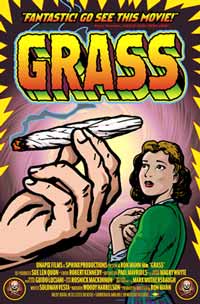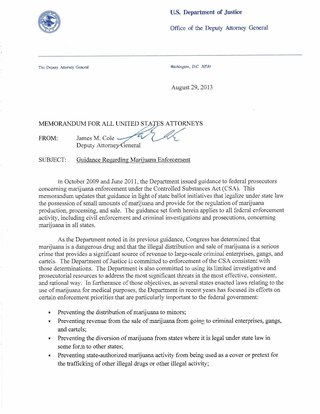Related Research Articles

Proposition 215, or the Compassionate Use Act of 1996, is a California law permitting the use of medical cannabis despite marijuana's lack of the normal Food and Drug Administration testing for safety and efficacy. It was enacted, on November 5, 1996, by means of the initiative process, and passed with 5,382,915 (55.6%) votes in favor and 4,301,960 (44.4%) against.
Drug czar is an informal name for the person who directs drug-control policies in various areas. The term follows the informal use of the term czar in U.S. politics. The 'drug czar' title first appeared in a 1982 news story by United Press International that reported that, "[United States] Senators ... voted 62–34 to establish a 'drug czar' who would have overall responsibility for U.S. drug policy." Since then, several ad hoc executive positions established in both the United States and United Kingdom have subsequently been referred to in this manner.

The war on drugs is the policy of a global campaign, led by the United States federal government, of drug prohibition, military aid, and military intervention, with the aim of reducing the illegal drug trade in the United States. The initiative includes a set of drug policies that are intended to discourage the production, distribution, and consumption of psychoactive drugs that the participating governments, through United Nations treaties, have made illegal.

In the United States, the removal of cannabis from Schedule I of the Controlled Substances Act, the category reserved for drugs that have "no currently accepted medical use", is a proposed legal and administrative change in cannabis-related law at the federal level. After being proposed repeatedly since 1972, in 2024, the U.S. Department of Justice announced it was initiating rulemaking to reschedule cannabis to Schedule III of the Controlled Substances Act.

In the United States, federalism is the constitutional division of power between U.S. state governments and the federal government of the United States. Since the founding of the country, and particularly with the end of the American Civil War, power shifted away from the states and toward the national government. The progression of federalism includes dual, cooperative, and New Federalism.

Grass: History of Marijuana is a 1999 Canadian documentary film directed by Ron Mann, premiered at the Toronto International Film Festival, about the history of the United States government's war on marijuana in the 20th century. The film was narrated by actor Woody Harrelson.

In the United States, the non-medical use of cannabis is legalized in 24 states and decriminalized in 7 states, as of November 2023. Decriminalization refers to a policy of reduced penalties for cannabis offenses, typically involving a civil penalty for possessing small amounts, instead of criminal prosecution or the threat of arrest. In jurisdictions without penalty the policy is referred to as legalization, although the term decriminalization is sometimes used for this purpose as well.

In the United States, increased restrictions and labeling of cannabis as a poison began in many states from 1906 onward, and outright prohibitions began in the 1920s. By the mid-1930s cannabis was regulated as a drug in every state, including 35 states that adopted the Uniform State Narcotic Drug Act. The first national regulation was the Marihuana Tax Act of 1937.

The use, sale, and possession of cannabis containing over 0.3% THC by dry weight in the United States, despite laws in many states permitting it under various circumstances, is illegal under federal law. As a Schedule I drug under the federal Controlled Substances Act (CSA) of 1970, cannabis containing over 0.3% THC by dry weight is considered to have "no accepted medical use" and a high potential for abuse and physical or psychological dependence. Cannabis use is illegal for any reason, with the exception of FDA-approved research programs. However, individual states have enacted legislation permitting exemptions for various uses, including medical, industrial, and recreational use.

In the United States, the use of cannabis for medical purposes is legal in 38 states, four out of five permanently inhabited U.S. territories, and the District of Columbia, as of March 2023. Ten other states have more restrictive laws limiting THC content, for the purpose of allowing access to products that are rich in cannabidiol (CBD), a non-psychoactive component of cannabis. There is significant variation in medical cannabis laws from state to state, including how it is produced and distributed, how it can be consumed, and what medical conditions it can be used for.

The Reagan era or the Age of Reagan is a periodization of recent American history used by historians and political observers to emphasize that the conservative "Reagan Revolution" led by President Ronald Reagan in domestic and foreign policy had a lasting impact. It overlaps with what political scientists call the Sixth Party System. Definitions of the Reagan era universally include the 1980s, while more extensive definitions may also include the late 1970s, the 1990s, and even the 2000s. In his 2008 book, The Age of Reagan: A History, 1974–2008, historian and journalist Sean Wilentz argues that Reagan dominated this stretch of American history in the same way that Franklin D. Roosevelt and his New Deal legacy dominated the four decades that preceded it.
Chris Bartkowicz is a state-licensed medical marijuana care-giver who was raided and arrested on the order of Denver area DEA agent Jeffrey Sweetin on February 12, 2010 after accepting an invitation by 9NEWS to do an interview about being a Colorado medical marijuana care-giver.

The legal history of cannabis in the United States began with state-level prohibition in the early 20th century, with the first major federal limitations occurring in 1937. Starting with Oregon in 1973, individual states began to liberalize cannabis laws through decriminalization. In 1996, California became the first state to legalize medical cannabis, sparking a trend that spread to a majority of states by 2016. In 2012, Washington and Colorado became the first states to legalize cannabis for recreational use.
The Donald Trump administration took positions against marijuana and against the easing of laws regarding marijuana. Although Trump indicated during his 2016 presidential campaign that he favored leaving the issue of legalization of marijuana to the states, his administration subsequently upheld the federal prohibition of cannabis, and Trump's 2021 fiscal budget proposal included removing protections for state medical marijuana laws.

Terms related to cannabis include:

The Cole Memorandum was a United States Department of Justice memorandum issued August 29, 2013, by United States Deputy Attorney General James M. Cole during the presidency of Barack Obama. The memorandum, sent to all United States Attorneys, governed federal prosecution of offenses related to marijuana. The memo stated that given its limited resources, the Justice Department would not enforce federal marijuana prohibition in states that "enacted laws legalizing marijuana in some form and ... implemented strong and effective regulatory and enforcement systems to control the cultivation, distribution, sale, and possession of marijuana," except where a lack of federal enforcement would undermine federal priorities.
During the administration of American President Richard Nixon (1969–1974), the United States turned to increasingly harsh measures against cannabis use, and a step away from proposals to decriminalize or legalize the drug. The administration began the War on Drugs, with Nixon in 1971 naming drug abuse as "public enemy number one in the United States."
During the administration of American President George H. W. Bush (1989–1993), the United States largely followed the precedents set by the cannabis policy of the Reagan administration, including prosecution of the War on Drugs.
U.S. President Joe Biden stated in February 2021 that his administration will pursue cannabis decriminalization as well as seek expungements for people with prior cannabis convictions. As of October 2022, Biden pardoned thousands of people convicted of marijuana possession under federal law. However, according to the Marshall Project, nobody was released from prison as a result of the October 2022 pardons, as no federal inmates were incarcerated for simple marijuana use at the time.
References
- ↑ "Barack Obama 'to overturn' Bush-era cannabis policy". Daily Telegraph. 2009-10-19. ISSN 0307-1235 . Retrieved 2018-04-27.
- ↑ "Obama: Marijuana Users Not High Priority". ABC News. 2012-12-26. Retrieved 2018-04-27.
- ↑ Lynch, Sarah N. (January 4, 2018). "Trump administration drops Obama-era easing of marijuana prosecutions". Reuters . Retrieved April 26, 2018.
- ↑ Richard Nixon's resignation speech , retrieved 2023-08-17
- ↑ Scherer, Michael. "What Is President Obama's Problem With Medical Marijuana?". Time. ISSN 0040-781X . Retrieved 2018-04-27.
- ↑ Bulman-Pozen, Jessica; Metzger, Gillian E. (2016-07-01). "The President and the States: Patterns of Contestation and Collaboration under Obama". Publius: The Journal of Federalism. 46 (3): 308–336. doi: 10.1093/publius/pjw008 . ISSN 0048-5950.